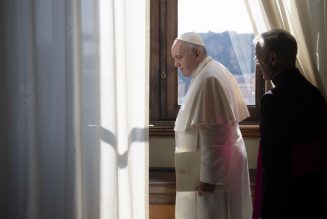An almost 90-year-old statue of the Sacred Heart of Jesus is seen Sept. 15, 2020, at St. Patrick’s Cathedral in El Paso, Texas, after it was destroyed by vandals. (CNS photo/Fernie Ceniceros, courtesy Diocese of El Paso)

 Last summer, I received a startling early morning text message from a Dominican brother. He shared a photo of the wall of one of our churches that had been tagged by graffiti. The vandal(s) had written the grotesque message, “abort the church.”
Last summer, I received a startling early morning text message from a Dominican brother. He shared a photo of the wall of one of our churches that had been tagged by graffiti. The vandal(s) had written the grotesque message, “abort the church.”
That was not long after the pregnancy resource center on Capitol Hill was vandalized. Located just a mile away from the U.S. Capitol, attackers threw red paint on the door and spray painted “JANE SAYS REVENGE” on the building.
These are just two attacks on two places I know well.
CatholicVote recently reported that nearly 300 attacks have occurred on Catholic churches since May 28, 2020. Those incidents include, according to the report, “arson attacks which damaged or destroyed historic churches; spray-painting and graffiti of satanic messages; rocks and bricks thrown through windows; and statues destroyed (often with heads cut off).” Since the unprecedented leak of the draft decision that became the historic reversal of Roe v. Wade, there have been 118 attacks.
I have a hard time imagining that such attacks would be tolerated in our country were they committed against synagogues or mosques. But attacks continue to be tolerated against Catholic churches, our ministries to the poor and pro-life pregnancy resource centers. CatholicVote reports that an arrest has been made in only 25% of cases.
Why have so few of these vandals been prosecuted? When St. Patrick Cathedral was attacked on Jan. 1, 2021, Cardinal Dolan called for justice. He wrote in the New York Post, “Those who break the law and scrawl their graffiti on a house of worship must also be held to account for their actions.” We are not failing any of the mandates of the Gospel when we demand civil protections for the free exercise of our religion. Nor are we faltering in our imitation of Christ when we call for accountability.
A healthy culture does not stoop to vandalism and destruction in the name of dialogue. In fact, one of the fundamental requirements of dialogue is mutual respect, wherein the opposing parties are assured of reciprocal goodwill. This does not mean a posture of conversion. Respect can be shown among parties that currently — and will continue to — disagree. Disagreement, after all, is not disrespectful. But these attacks are bigotry, pure and simple.
While we may be tempted to believe that the series of attacks on our churches belongs to another series of cries from the boy who cried wolf, the situation now is no children’s fable. The numbers are astonishing. The U.S. bishops reported that more than 100 acts of vandalism occurred at Catholic sites from May 2020-Oct. 2021 alone. “These are not mere property crimes,” the bishops said, “These are acts of hate.”
Others might say that talking about these acts of vandalism forces the Church to adopt a victimized posture. But bringing to light the truth, advocating for the preservation of our beloved houses of worship and centers of service is now necessary. Defending our patrimony against cruel and unjust treatment is hardly self-victimization. Instead, we have to articulate calmly, charitably, why our fellow citizens who may well have no love for the Church ought to be concerned.
Some might consider the violence just retribution for sins committed by the Church’s leaders. Where there is need for repentance on the part of the Church’s members, we should courageously ask forgiveness. But restitution must be sought in courts, according to the mind and arbitration of the common good. Justice is not served by vigilantism or retaliation.
In the end, we must do as Jesus asked us to do. We must pray for our enemies, for those who persecute us. For in the end, the love of Christ will heal the wounds of misconception and anger. We should consider ourselves blessed to suffer for the Gospel. And we should pray for the grace to suffer patiently.
Father Patrick Briscoe, OP, is editor of Our Sunday Visitor. Follow him on Twitter @PatrickMaryOP.






